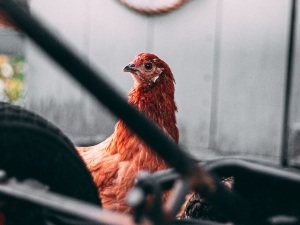
Illnesses in chickens can spread through a flock very quickly, if you don’t take care of your sick bird then the bird may begin to suffer a great deal, an aggressive illness may even kill your bird.
This article looks into treatments and remedies for eye infections in chickens.
Table of Contents
Home remedies for a chicken eye infection:
Eye infections are quite serious and need to be treated as quickly as possible. If you realize that your bird has an eye infection, you can save the bird’s eye if the correct medications are given.
Chicken eye infections are usually treated using antibiotics, antibiotics are usually prescribed for other types of infections as well. Supportive treatments can also be used on your bird to help treat the eye infection.
Here are some home remedies that you can use as supportive treatments for your chicken’s eye infection:
Saline:
Cleaning the infected eye is a must, this is especially true if the bird’s eye is leaking or producing discharge.
You can use a saline solution to clean the bird’s eye. Wash the bird’s eye with a saline solution around 3 times a day to help keep it clean.
Aspirin:
Eye infections can be quite uncomfortable, and even painful, for your bird. Giving the bird aspirin will help with the pain.
The dosage of aspirin that you should be giving your bird will depend on the bird’s weight. Consult with a vet about how much aspirin to give your bird.
Electrolytes:
Electrolytes help chickens manage stress, an eye infection is quite stressful to birds.
You can buy ready-made electrolytes, or, you can make an at-home electrolyte solution to give to your bird. Electrolytes should be given in place of water. Note: do not offer your bird electrolytes for extended periods of time.
Colloidal silver:
Colloidal silver is said to be a good treatment for a variety of infections and diseases, it is used topically by people who want a natural treatment for their skin infections, and, it may be helpful to your bird.
Consult with your vet about the use of this product in addition to your bird’s regular antibiotics.
Isolation:
Isolating the bird is almost as important as medicating the bird. Isolating the bird as soon as you realize that the bird has an eye infection is highly recommended.
Isolating the bird will keep other birds from pecking at the sick bird’s eye and will allow the sick bird to heal in peace. Keeping your bird isolated will also keep your other birds safe should the infection be contagious.
Give your bird access to its own food and water while in isolation.
Antibiotics:
Eye infections are quite serious, only using home remedies to treat your bird is not recommended.
You’d need to feed antibiotics to your bird as a way of treating the eye infection, home remedies can be given in addition to the antibiotics.
Home remedies, when used on their own, will not cure the bird’s eye infection. Your vet may prescribe an oral antibiotic or antibiotic drops for the bird’s eye infection.
What to avoid:
Bleach:
Bleach may be useful when looking to clean your chicken coop but it should not be used in your bird’s eye to treat the bird’s eye infection, in fact, bleach should not be used anywhere on the bird’s body.
If used on an open wound or an infection bleach will give the bird a bleach burn eating at the bird’s eye and making the flesh turn black
Alcohol:
Alcohol is sometimes recommended for wounds on animals, but we don’t recommend using this on your chicken’s eye infection. Alcohol will burn like fire if poured into your bird’s infected eye so avoid using it.
Peroxide:
This is another chemical that is sometimes recommended for injured birds, but it should also be avoided.
Peroxide, if used in the bird’s eye, will irritate the bird’s eye and, it won’t help with healing the bird’s eye. In fact, it will do the opposite.
Peroxide is quite a strong chemical. Yes, it will kill off unhealthy and dead cells in the chicken’s eye but it will also kill off healthy, live cells, which will negatively affect the healing process.
If you enjoyed this article then you may also be interested in other chicken related articles. Here are some articles that you may be interested in: Chicken Shaking Head And Opening Mouth, Baby Chick Shaking Head, White Pus In Chicken Eye, Yellow Pus In Chicken Eye, Chicken Shaking Head And Closing Eyes

